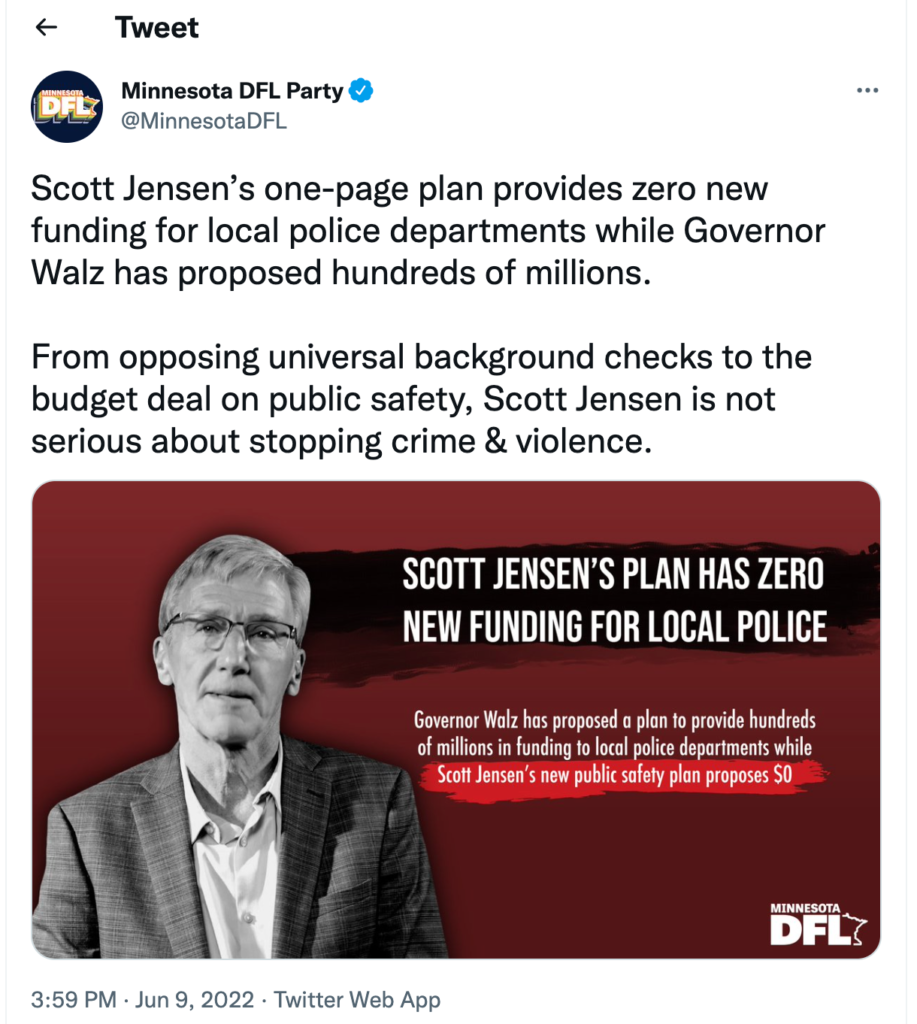Now that session is done, it’s safe for Walz to propose tax cuts
If you put Governor Walz’s tax proposals on an X/Y axis, you would see an inverse relationship between how generous the tax proposal is, to how little chance it has to pass. At the beginning of his term in office, Walz proposed huge gas tax increases. At the beginning of the 2022 session, Walz proposed an insulting one-time rebate check and named it after himself.
Now that session is over and a special session unlikely, Walz proposed a $2,000 one-time rebate check for Minnesota families over the weekend. Of course a one-time payment will do nothing to stop the massive overcollection of income taxes that continues in Minnesota even after the latest budget forecast in February. It’s a desperate attempt at a headline as the 2022 campaign heats up and polling shows the governor’s race to be a dead heat between Walz challenger Scott Jensen.
With a special session now very unlikely, here is the wrap-up on key issues for 2022.
Taxes
The 2022 session started with such optimism for a permanent tax cut. The Senate proposed eliminating Social Security income from taxes and cut the bottom income tax rate from 5.35% to 2.80%. Gov. Tim Walz proposed a one-time rebate check of $1000 and House Democrats proposed using the surplus to redistribute wealth from taxpayers to non-taxpayers. At least everyone was talking taxes, and that talk resulted in an end-of-session tax deal that kept the Social Security tax cut and a more modest cut to the lowest income tax bracket.
Leaders sold the bill as a $4 billion tax cut, but once the details came out only $2.2 billion qualified as permanent tax cuts. The rest of the bill was spending on Local Government Aid (LGA) and redistribution of wealth.
Education
In the end it didn’t matter because the tax bill was held hostage by House Democrats who wouldn’t pass it unless their demands in K-12 spending were satisfied. Their demands mirrored the issues raised in the Minneapolis teacher’s strike, which was a ploy to get more spending out of the legislature. In conference committee, Senate Republicans offered House Democrats what they said they wanted most – hundreds of millions of dollars in new spending. But Democrats overplayed their hand and ended up with nothing. Minneapolis voted last week to cut another $27 million from their budget to pay for the unsustainable deal they made with their striking teachers.
Energy
Energy wasn’t really part of the end-of-session negotiations, but with rolling blackouts predicted and gas prices climbing to $5 per gallon, Minnesotans will be looking back at the 2022 session to see who tried to help and who made it worse.
The first question they’ll ask is why didn’t we allow nuclear power to be included in the mix of energy sources? It’s the cleanest form of energy on the market and provides reliable baseload energy when the wind isn’t blowing and the sun isn’t shinning.
The second question they’ll ask is what was done to lower the cost of driving? Gov. Walz and Minnesota Democrats are going to have to explain why they tried to increase the cost of driving three different times:
- Gov. Walz went around the legislature and put in place rules to force car dealers to inventory electric cars well above market demand. This will raise the price of buying a car in Minnesota, forcing the Minnesota Auto Dealers Association to take Walz to court.
- Gov. Walz and House Democrats have supported huge increases to the gas tax in the past three years. It’s in their hearts and on their minds and they will likely do it again if the political environment allows it.
- Gov. Walz and House Democrats recommended adopting California’s fuel standards which could raise the price of gas another $2 by forcing fuel companies to buy credits.
Crime
Senate Republicans passed a very strong public safety bill including American Experiment’s two top priorities, but for some reason they ignored the polling data and failed to market the proposals correctly. For example, their proposal for a Three Strikes law was renamed “Aggravated & Consecutive Sentences for Violent or Repeat Offenders.” Good policy, bad marketing.
The House stubbornly doubled down on their top solution for reducing violence: more money for unaccountable non-profits, learning nothing from the Feeding Our Future food scandal. A DFL Party response to Scott Jensen’s recent public safety plan says it all about the different approaches of the parties toward problem-solving:

Criticizing Jensen’s plan because it doesn’t spend money as if spending money is the key to government solutions to society’s problems. The House and Senate remain further apart on public safety than any other legislative issue so it’s no surprise nothing got done.
With lawmakers and Gov. Walz switching their focus from the Capitol to the campaign, this will probably be the last Capitol Watch of the year. Thanks for reading!
This content originally appeared in our Capital Watch email.
Subscribe to Capitol Watch
Minnesota political news from an insider’s perspective.